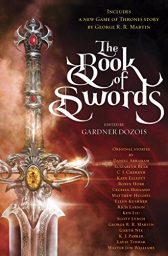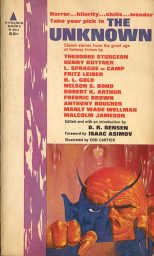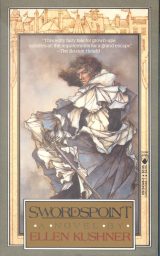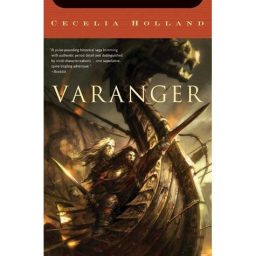 I had heard about the anthology The Book of Swords sometime last year before its publication. The cover looked good but I was not filled with any great enthusiasm. I have read anthologies edited by Gardner Dozois and George R. R. Martin starting with Warriors (Tor Books, 2010). I wrote a review of the anthology three years ago where I had this to say:
I had heard about the anthology The Book of Swords sometime last year before its publication. The cover looked good but I was not filled with any great enthusiasm. I have read anthologies edited by Gardner Dozois and George R. R. Martin starting with Warriors (Tor Books, 2010). I wrote a review of the anthology three years ago where I had this to say:
“A gripe of mine about this book, the overall tone of this book was depressing punctuated with episodes of the nihilistic. A theme of nastiness pervaded it. The sense of adventure that you got reading Poul Anderson, Heinlein, Robert E. Howard, or even Lin Carter was lacking overall here.”
I dutifully read Rogues (2013) and Dangerous Women (2014), and reviewed them. Even though George R. R. Martin was not present as editor for The Book of Swords, I had a good idea of what was coming.
The local library has been procuring these volumes as they come out so I did not have to spend any money on a book I had a feeling I would be reading once. The release date was October 10, 2017 and the library had it a few weeks later. I was the first to sign it out.
Bantam Books is the publisher, 544 pages. Price is $30.00. There are 16 stories, really novelettes of around 25-30 pages.
Dozois has a rather long introduction where he discusses first discovering sword and sorcery fiction in the Pyramid Books anthology The Unknown in  1963. That paperback contains a Fafhrd and the Gray Mouser story by Fritz Leiber. Shortly thereafter, L. Sprague de Camp’s Sword and Sorcery (also by Pyramid Books).
1963. That paperback contains a Fafhrd and the Gray Mouser story by Fritz Leiber. Shortly thereafter, L. Sprague de Camp’s Sword and Sorcery (also by Pyramid Books).
A mini-history of fantasy publishing in the 1960s including the Tolkien boom is given. Dozois points out the Ace paperback edition of The Lord of the Rings “makes it clear that Wollheim though of it as a ‘sword & sorcery’ book.”
“In other words, in the United States at least, the genre audience for fantasy definitely predated Tolkien, rather than being created by him, as the modern myth would have it. Don Wollheim knew very well that there was a genre fantasy audience already out there, already I place, a hungry audience waiting to be fed–although I doubt if even he had the remotest idea just how tremendous a response there would be to the tidbit of ‘sword & sorcery’ that he was bout to feed them…Oddly, as fantasy books began to sell better by far than ever before, interest in Sword & Sorcery began to fade.”
Dozois gives credit to George R. R. Martin’s A Game of Thrones for a new interest in harder, grittier fantasy. Dozois makes me laugh with:
“Already there’s another generation of newer writers such as Ken Liu, Rich Larson, Carrie Vaughn, Aliette de Bodard, Lavie Tidhar taking up the
challenge.”
Carrie Vaughn is the one who wrote “Strife Lingers in Memory” where the hero of the story wanders the castle halls at night bawling his head off.
Dozois appears to be oblivious to the small press outfits like Rogue Blades Entertainment and the later Flashing Swords books/magazines.
Gardner Dozois mentioned this in the introduction:
“As the eighties progressed into the nineties, Sword & Sorcery continued to fade as a subgenre, until it was rarely ever mentioned and was in danger of being altogether forgotten.”
Hey Gardner. You were editing the “Exclamatory” anthology series for Ace Books from 1980 to 1998. You could have slipped Swordsmen! in the mix if you were so concerned with the genre. But you didn’t.
Now to the stories:
K. J. Parker “The Best Man Wins,” is told in the first person. This made me take a double take:
“The sword isn’t a very good weapon. Most forms of armor are proof against it, including a properly padded jerkin, it’s too long to be handy in a scrum and too light and flimsy for serious bashing. In a pitched battle, give me a spear or an axe any time; in fact, nine time out of ten you’d be better off with everyday farm tools–staff-hooks, beanhooks, muck-forks, provided they’re made of good material and properly tempered.”
For not being a very good weapon, the sword has certainly had a very long life. I do like axes. The Irish enthusiastically took up the axe and made Dublin Bay red with Viking blood at the Battle of Clontarf. Swordsmen got under pikes and cut down the pike wielder first in the Roman-Macedonian wars and again Spanish sword and buckler men vs the Swiss phalanx in northern Italy during the Renaissance.
There is the obligatory weariness and cynicism with a dig at the Crusades to boot:
“My wars were in Ultramar; which isn’t a place-name, it’s just Aelian for ‘across the sea.’ Ultramar, which was what we were fighting for, wasn’t a piece of land, a geographical entity. It was an idea; the kingdom of God on Earth…We lost, and all the place we used to know are called something else now, in another language, which we could never be bothered to learn?”
Robin Hobb’s “Her Father’s Sword” has annoying teenage girl as the main character. Her village is under attack by lobotomized family members captured by the enemy days earlier. They act like zombies of current media. She ends up siding with her zombie father.
“The Hidden Girl” by Ken Liu is set in Tang Dynasty China. I am up for a good far Eastern story with different weapons. Most of the story is origin and told in first person present tense, which I can’t stand. Young girl abducted by sorcerous assassins and trained in the art. The girl assassin gets cold feet on her first assignment.
I sometimes wonder if Matthew Hughes is Jack Vance’s bastard child. I have liked what I have read by Hughes in the past. This is no exception with “The Sword of Destiny.” Good Vance pastiche starring Baldemar.
Kate Elliott- “I Am a Handsome Man,” Said Apollor Crow.” A sort of fantasy Rome but not very historical. Characters with names as Honeyed Voice. I found it too precious.
Walter Jon Williams’ “The Triumph of Virtue” is sword and musket. Foiled conspiracy but with lots of talk and little action.
Daniel Abraham “The Mocking Tower”has a lost prince seeking to destroy a sword with his father’s soul in it. Nothing ending.
C. J. Cherryh’s “Hrunting” is set generations after Beowulf. Halli, grandson of Unferth, the guy who questioned Beowulf and lent the sword, looks for the sword. The writing is good but Cherryh inverts the story of Beowulf. Halli talks to the ghost of Grendel’s mother:
“Our sacred place you took for your feasting. Our forests you cut for your cookfires. Our meadows you gave to your great slow beasts. You hunted our deer and our hares. You hunted us for sport. How shall we not take your cattle? How shall we not take food from your tables?”
Halli –“He (Beowulf) struck you from behind, as you slept.”
I am so tired of the subversion of the heroic legends. The monsters are innocent and Beowulf is a coward. I used to like C. J. Cherryh. I am done with her.
I hated the first Garth Nix “Sir Hereward and Mister Fitz” story I read in Swords & Dark Magic. “A Long, Cold Trail” is more to my taste. Moorcockian plot in dealing with rampaging godlets. Council for the Treaty of the Safety of the World. Really? A mix of humorous with Earth destroying consequences. Deus ex machina ending with this tidbit:
“Kishtyr was one of his favorite cousins, and a former lover besides, who might well be one again.”
Ellen Kushner returns to Riverside with “When I was a Highwayman.” Swordspoint is a very representative of the late 1980s down to the Thomas Canty  cover. This is not a bad story but a bit on the slow side with some domestic items such as this:
cover. This is not a bad story but a bit on the slow side with some domestic items such as this:
“Then Jess got pregnant, despite all our care, and it was expensive to get rid of it.”
Richard, swordsman turned highwayman, has to subdue a noblemen he knows while holding up his carriage. He does it with a big long wet kiss on the lips. No supernatural elements present in this story.
I absolutely hated Scott Lynch’s story “In the Stacks” also in Swords & Dark Magic. His story in Fearsome Journeys did not wow me. “The Smoke of Gold is Glory” on the other had in one of two of my favorite stories in this book. Great cast of characters. One of the best dragon fights ever. Will be reprinted in one of the Year’s Best Fantasy. I will be looking to read more Scott Lynch.
Rich Larson’s “The Colgrid Conundrum” has steam punk trappings. Very gray with no color. It failed to grab me.
Elizabeth Bear’s “The King’s Evil” has puffy shirt era technology. Characters with names as The Dead Man. Voyage to an island with very large dangerous wasps. Sort of a lost world type adventure homage but something was missing that I can’t put my finger on.
Lavie Tidhar’s “Waterfalling” is very trippy. Not sure if on another planet or future. Guns, not swords. The main character is an addict getting high off of god energy.
“Somewhere far behind him lay the Black Tor, and its enigmatic master, the dark lord whom Gorel knew only as Kettle. The Avian mage was a small, slight being, his fragile bones like those of a bird…Kettle had used Gorel, and Gorel could not forgive his onetime lover for that betrayal.”
 Cecelia Holland’s “The Sword Tyraste” has a Dark Ages Scandinavia setting. The other of the two best stories in this book. Vagn is survivor of deliberate shipwreck. He joins the petty king who is responsible. The king has a dwarf made sword. Very entertaining. Holland had a great story in Warriors. I would love to see a collection of shorter works in the future.
Cecelia Holland’s “The Sword Tyraste” has a Dark Ages Scandinavia setting. The other of the two best stories in this book. Vagn is survivor of deliberate shipwreck. He joins the petty king who is responsible. The king has a dwarf made sword. Very entertaining. Holland had a great story in Warriors. I would love to see a collection of shorter works in the future.
George R. R. Martin is going to die before he ever finishes A Song of Ice and Fire. “The Sons of the Dragon” is another story/history of the sons of Aegon I Targaryen after he conquers Westeros. Lots of incest, family killing etc. Almost indistinguishable from the stories/histories in Rogues and in Dangerous Women.
Martin is a big selling point of this anthology. I went to Amazon to look at reviews and many buyers seem to have bought this book solely for the Martin piece.
So, this anthology did not fail to disappoint, though I was expecting this result. I give The Book of Swords a 1.5 out of 5 rating. Two stories I really liked, two that were mildly entertaining. One well-written story but infuriating for subversion, the rest– meh.
Some things I noticed– normal male-female relationships are absent. I don’t read much of modern fiction. Is this the case in general?
Most of the authors do not know how to write action scenes. It reminds me of James Reasoner’s observation of Michael Chabon’s novel Gentlemen of the Road. The novel is well written but Chabon seemed uncomfortable with action scenes. If you are going to write sword and sorcery, restraint is not a virtue. Most of the stories are banal, trivial, and boring. The most damning thing that can be said about a sword and sorcery story is that it is boring.
This book is a bait and switch. It is a eunuch in armor. It is a sheep in wolf’s clothing.
The HBO Game of Throne series is responsible for any sort of popularity of “grim dark” fantasy. This is not a renaissance of sword and sorcery by any means. Most mass-market fantasy can be divided into sword & scatology where the author is just keeping it real. The other type of fantasy can be called “estrogen fantasy” as the writers are getting in touch with their emotions.
About ten years ago, there was a crop of newer writers: Bill Ward, Ty Johnston, Steve Goble, Bruce Durham. They were showing up in the revived Flashing Swords, the Rogue Blades Entertainment anthologies, and other small press publications. These writers were rough at times in writing style but they were sincere. These are the people I want to see in a big hardback. I don’t get the same enthusiastic vibe with The Book of Swords.
There are modern cultural things inserted into some of the stories. Maybe the idea is to make them “edgy.” I think the end result will be this sort of thing is going to look very dated in twenty years.
So glad someone else took the bullet on this one instead of me
-
I’m with you on that, Fletcher.
-
I scanned to ToC and said my Freedom Word: No.
-
Modern traditional SF publishing has really become gripped by the literati idea that action is a shameful thing to be minimized. And the idea that characterization is what happens when action isn’t happening. So you tend to get a lot of (very well written!) novels long on talking and short on doing, greatly to their detriment.
“A gripe of mine about this book, the overall tone of this book was depressing punctuated with episodes of the nihilistic. A theme of nastiness pervaded it.”
Their Old Venus anthology was marred by similar problems.
https://everydayshouldbetuesday.wordpress.com/2016/08/25/throwback-sf-thursday-old-venus-edited-by-george-r-r-martin-and-gardner-dozois/
-
This echoes the current attitudes in society where the platitudes one says is more important than the actions one does. (Call it social media syndrome.)
-
“Modern traditional SF publishing has really become gripped by the literati idea that action is a shameful thing to be minimized.”
You can thank William Dean Howells for that. He was the patriarch who founded that school of criticism.
I am done with these Dozois/Martin anthologies. My condolences to those who are professionally obliged to wade trough every single one of them.
Anyway, Hughes is a gud ‘un. I’m surprised that he isn’t brought up more often around these parts. His first Vancian novel, Fool’s Errand, is basically old fashioned moral allegory in this Vancian package. Afterwards he used the same science fantasy backdrop for everything from cynical Vancian scoundrel yarns, trough detective/mystery stories to high adventure.
-
I need to read Hughes. An uathor like that is good to have around, especially since Michael Shea died.
-
Shea is greatly missed. Related to this line of anthologies – his Cugel novella “Hew the Tintmaster” that, for some reason, wasn’t included in the Vance tribute one even tho it was originally written for it (I guess that editors needed free space for more “well known” contributors), makes for a better reading than the majority of stories that appeared in that anthology.
-
-
The Vance angle tipped me off so I checked and sure enough one of Hughes’ Raffalon stories is one of the best stories I’ve read in the Magazine of Fantasy and Science Fiction.
Shame to hear about Cherryh’s offering. My first introduction to Neil Gaiman was his screenplay adaption of Beowulf where he did the same thing and he’s been on my “don’t touch” list ever since because I’ve got the same reaction to subversion. I’m just so damned tired of it.
Guess no one reads Scott Bakker but me
-
That would be incorrect. Out of all the Eriksons, Martins, Abercrombies etc out there, the only one who I can read more than one novel from is Bakker. He is sincerely a Tolkien fan, but also a sincere fan of Robert E. Howard and Lovecraft. It shows. He could’ve used his Second Apocalypse series to slam Western Civ/the Crusades but didn’t rise to the bait. He’s certainly not perfect and I don’t recommend him to everyone, but he’s far above his compeers, IMO. He can write good action, for one thing.
-
I’ve tried to read his “Neuropath”, which turned out to be pushing the same view of human condition as one finds in “Blindsight” by Watts, only in far less artful and compelling package and in what was really more obviously didactic manner. That, combined with the brief look at his blog (which revealed that, like with Watts and “Blindsight”, he indeed holds such views as were underlying his book), persuaded me against spending any more of my time on his writing.
Sorry to get here late, but I gather this had nothing to do with Saberhagen’s “Swords” series?
Alas.
-
Nothing at all. Richard F. Burton seems to have first used the title back in the 1800s.
I’ve always liked Saberhagen’s Empire of the East/Swords novels. Some really great concepts and a few cool characters, but something about them always left me just a little bit flat. Saberhagen didn’t quite match the quality of his stories and characters to the truly awesome ideas he came up with. Just my opinion.
-
Yep. Awesome ideas, meh characters. From the author of the BERZERKER stories I kept hoping for better.
As it was, Draffut, and Ardneh’slovely reveal at the end of the first series, were pretty much it, as far as I was concerned.
-
Most recent genre short fiction could be described as bait-and-switch.
I’ll be blogging about this topic, hopefully in February.
” normal male-female relationships are absent. I don’t read much of modern fiction. Is this the case in general?”
Yes. See, for example, STAR TREK: DIVERSITY, or the new Star Wars movie, or the whole volume of SJW Marvel offerings, or Disney’s FROZEN or MOANA. If you notice, in MAN OF STEEL, the classic two sided love triangle of Lois Lane loves Superman but hates Clark Kent who loves Lois Lane was absent.
Heterosexual romance is no longer to be portrayed in adventure fiction, science fiction, fantastic fiction, or children’s literature. The days when Prince Barin loves Princess Aura loves Flash Gordon loves Dale Arden who is also pursued by Ming the Merciless are gone … if these filthy orc lords have their way.